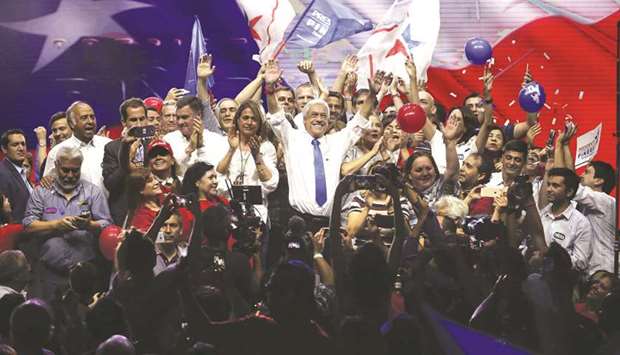That groundswell, evident in the first round of the poll on November 19, has threatened the comeback chances of conservative billionaire Sebastian Pinera.
Until the November vote Pinera — president 2010-2014 — seemed to be a shoo-in to follow socialist President Michelle Bachelet, who cannot seek re-election under the constitution.
But Pinera, 68, is now in a much tighter race than anticipated against Alejandro Guillier, 64, a senator and veteran TV presenter who is Bachelet’s candidate.
Pinera received a lower-than-expected 37% of the votes in the first round. Guillier, on the centre-left, trailed with 22%.
But tomorrow he will likely pick up support from backers of Beatriz Sanchez of the radical-left Frente Amplio party.
Sanchez, 46, surprised pundits by coming in third in the November election with an unexpectedly high 20% of the vote.
Adding to the nail-biting uncertainty is that no reliable surveys have been published since the first round of voting.
The outcome will decide whether Chile — a prosperous South American nation that is the world’s leading producer of copper — is governed by the right or the left for the next four years.
“The election will probably come down to a difference of less than 20,000 votes,” said political scientist Marcello Mella at the University of Santiago.
“The mathematics are in favour of Pinera, the momentum is tipped toward Guillier,” another analyst, Francisco Jose Covarrubias, wrote in the El Mercurio newspaper.
The battle for the presidency made for sharp exchanges in a televised debate on Tuesday.
Guillier “has been a senator for four years and an outstanding journalist, but I have doubts that he has the experience, or the teams, or the programme to pull Chile out of the stagnation and frustration we are in today,” said Pinera.
“I’m not promising heaven and earth, but I promise that Chile will grow robustly,” he said.
Guillier shot back: Pinera “was president of Chile and didn’t do the things that we are putting forward — he promised them, but many of them fell apart.”
Both candidates are fiercely wooing the 13.4mn voters who will choose the next president.
Analysts say that a higher turnout should give the edge to Guillier. He could get that high turnout if he “mobilises people through an anti-Pinera message based on opposition to an oligarchy,” said Mella.
Pinera in turn has to win the 500,000 votes cast for Jose Antonio Kast, his far-right rival in the November election.
Pinera undermined his image of an ex-leader riding back into the presidency by speaking of possible voter fraud in the first round. That generated strong criticism and led Sanchez to say she was voting for Guillier.
To make up some ground, Pinera has vowed to maintain free university tuition brought in by Bachelet for some students — contradicting a previous statement that “free things mean less commitment.”
Brian Zuniga, a student who spent $10,000 for the first two years of his university degree but who now pays nothing, recognised that, “in this election, we count for a lot.”
Guillier has promised to expand the free tuition policy to 70% of students and submit legislation that would make it free for all by 2020.
The issue has historical roots: free tuition was scrapped in 1981 under the 1973-1990 Augusto Pinochet military dictatorship. Bachelet partly reversed that in 2016.
Many students voting for the first time in the November election supported Sanchez.
Now, “I don’t know who I’m going to vote for,” said Emilia Moya, a journalism student at the University of Chile. “The two are disastrous but one is going to take us back more than the other.”
For her, Guillier represented “the lesser evil.”
Chile’s economy is another important issue, and one that Pinera — worth $2.7bn according to Forbes magazine — claims he would steward the best.
During Bachelet’s term Chile suffered a period of lower economic growth. Its GDP is forecast to expand a modest 1.4% this year, the lowest pace in eight years.

